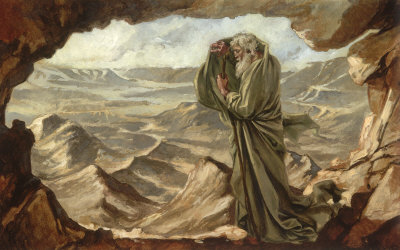This week we are reading about the fallout from the Contest on Mount Carmel and Elijah’s journey to Mount Horeb. Please read and re-read 1 Kings 19.
Divine Q & A on Mount Horeb: (1 Kings 19:9-10)
From the wilderness south of Beersheba, Elijah takes the forty-day journey to Mount Horeb. (Mount Horeb is another name for Mount Siani.) Horeb is the mountain where God gave Israel the Ten Commandments. Ex. 19-20, Deut. 5:2. Elijah is journeying back to the birthplace of God’s covenant with Israel. If you have time today, please read about God’s theophany to Moses at this very place as recorded in Exodus 19.
At Horeb, Elijah finds refuge in a cave, just like Moses did. Ex. 33:22, v.9. God inquires of Elijah “What are you doing here?” In the Jewish tradition, God’s question can be read in different ways. First, God may be trying to get Elijah to clearly articulate his understanding of why God called him to this mountain. God is like a school principal asking a student if they are aware as to why they have been sent to the principal’s office. On the other hand, God never explicitly told Elijah to flee to Beersheba or to Horeb. Therefore, God is questioning Elijah as to why Elijah abandoned his job as a prophet of tending God’s flock. God is like a school principal asking a student why they happen to be wandering the halls when they should be in class.
Elijah answers God’s question “I have been very jealous for the Lord . . . I, even I only, am left.” v.10. Elijah feels that he has been fighting the battle for God’s honor all by himself. Elijah brings the story back to himself. God may be the subject matter, but Elijah is the star. His answer is a veiled indictment of Elijah’s perception of God’s inaction. God may have sent the fire from heaven, but Elijah is the one who set up the contest and who had to slay the prophets of Baal.
Theophany on Mount Horeb: (1 Kings 19:11-12)
God responds to Elijah by telling him to leave the safety of the cave to meet God. When Moses did the same thing centuries earlier, there were thunders and lightnings, trumpet blasts, smoke and fire, and the whole mountain shook with God’s presence. Ex. 19:16-18. Elijah immediately experiences the forces of nature with a whirlwind, an earthquake, and a fire. But God was not found in these power manifestations. Rather, God appears to Elijah in the “sound of sheer stillness/silence.” v.12.
What transpires in this theophany is God’s tacit rebuke of Elijah’s means and methods. Elijah wants a violent triumphant God that will vanquish his enemies. Elijah seeks to emulate this god in his zeal and fanaticism. But God is telling Elijah that fanaticism and violence will not win the day, rather it is silence and stillness, gentleness and love that will bring about God’s victory. This also means that the battle between Yahweh and Baal (good and evil, etc.) is no longer about Elijah and what Elijah can do.
For us as Christians who know the rest of the story, this theophany is a microcosm of Advent and Jesus’ ministry in general. In Advent we celebrate the coming of the day of the Lord, not with thunders and lightnings, whirlwinds and earthquakes, but as a baby born in a manger. Jesus is not the fanatical zealot of Elijah, but the sheep who is silent before his shearers. Acts 8:32 (Isa. 53:38). God’s theophany to Elijah anticipates God’s incarnation in Jesus.
Second Divine Q&A on Horeb: (1 Kings 19:13-18)
After God appears to Elijah in the still small voice of silence, God again repeats his question, and Elijah again gives the same answer. Elijah completely misses the message of God. Again, the rabbis supplement the conversation with God responding to Elijah’s answers with more questions: “Is it my covenant, or yours? . . Is it my altars or yours? . . . Are they my prophets, or yours?” The prophet’s job is to intercede on behalf of the people. Abraham intercedes for Sodom and Moses intercedes for Israel. Gen. 18:22-33, Ex. 30:30-32. But Elijah’s conversation with God is only about him. His religion remains self-focused. Therefore, Elijah will get replaced.
Elisha: (1 Kings 19:15-21)
God tells Elijah to leave the mountain. Elijah is to anoint Hazael king of Syria, Jehu king of Israel, and Elisha as his prophetic successor. According to the Scriptures, however, it was Elisha who anointed Hazael and Jehu after Elijah was taken up into heaven. The Scriptures do not tell us if Elijah did anoint Hazael. 2 Kings 8:15, 2 Kings 9:6. It is Jehu who will violently destroy Ahab’s descendants and the Baal worshipers in Israel. 2 Kings 10.
The readings for tonight end with Elijah’s anointing of his successor, Elisha. Elisha is plowing his field with twelve (!) yoke of oxen when Elijah comes upon him. In Elijah’s call to Elisha, we should see a prefiguation of Jesus’s call to his disciples. Elijah commands Elisha to leave everything behind – home, family, work – to follow him. When Elisha requests to go say goodbye to his parents, Elijah is angered. This is Jesus’s reaction as well. Luke 9:57-62.
Dinner is at 6. The menu is shepherd’s pie. Discussion about 6:45. Hope to see you here!
Lead on, O King eternal,
Earnest Shurtleff, Lead On, O King Eternal, v.2
Till sin’s fierce war shall cease,
And holiness shall whisper
The sweet amen of peace.
For not with swords loud clashing,
Nor roll of stirring drums;
With deeds of love and mercy
The heavenly kingdom comes.

